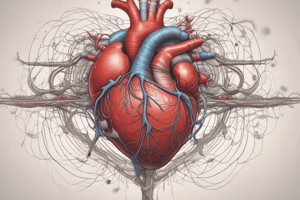Podcast
Questions and Answers
What is the primary function of the heart mentioned in the text?
What is the primary function of the heart mentioned in the text?
- Removing waste products from the body
- Transporting essential nutrients throughout the body
- Ensuring the continuous circulation of blood (correct)
- Supporting the body's overall metabolic processes
Why is oxygen essential for cells?
Why is oxygen essential for cells?
- To produce energy through cellular respiration (correct)
- To transport essential nutrients throughout the body
- To remove waste products from the body
- To support the body's overall metabolic processes
What does the heart do to ensure that oxygen and nutrients are delivered effectively?
What does the heart do to ensure that oxygen and nutrients are delivered effectively?
- Supports the body's overall metabolic processes
- Pumps deoxygenated blood to the lungs for waste removal
- Maintains a steady flow of oxygenated blood to all parts of the body (correct)
- Pumps nutrient-rich blood to various tissues and organs
What is the role of the heart in removing waste products from the body?
What is the role of the heart in removing waste products from the body?
How does the heart support the body's metabolic functions?
How does the heart support the body's metabolic functions?
Flashcards are hidden until you start studying
Study Notes
The heart is an incredibly important organ in the human body, responsible for pumping blood to all parts of the body. Its function is essential for sustaining life and maintaining good health. Let's take a closer look at the function of the heart and how it accomplishes this vital task.
Function of the Heart
The primary function of the heart is to pump blood throughout the body, delivering oxygen and nutrients to the cells and removing waste products such as carbon dioxide. This process is essential for the body's survival and overall well-being.
Circulation of Blood
The heart achieves its function through a complex system of circulation. When the heart beats, it contracts and relaxes in a rhythmic manner, allowing it to pump blood effectively. This rhythmic action is what keeps the blood flowing continuously throughout the body.
The heart consists of four chambers: the left and right atria (upper chambers) and the left and right ventricles (lower chambers). Blood enters the right atrium from the body, then flows into the right ventricle. From there, it is pumped to the lungs, where it picks up oxygen and releases carbon dioxide. Oxygenated blood returns to the left atrium and is then pumped into the left ventricle. Finally, the left ventricle pumps the oxygen-rich blood out to the rest of the body.
Oxygen Delivery
One of the most crucial functions of the heart is to ensure that every cell in the body receives an adequate supply of oxygen. Oxygen is essential for cellular respiration, the process by which cells produce energy. Without oxygen, cells would not be able to function properly, and overall health would deteriorate.
The heart achieves this by maintaining a steady flow of oxygenated blood to all parts of the body. Through its pumping action, the heart ensures that oxygen is delivered to tissues and organs, allowing them to carry out their respective functions effectively.
Nutrient Delivery
In addition to oxygen, the heart is also responsible for transporting essential nutrients throughout the body. Nutrients such as glucose, amino acids, and fatty acids are carried by the blood to various tissues, where they are used for energy production, growth, and repair. The heart's function ensures that these nutrients are distributed evenly, supporting the body's overall metabolic processes.
Waste Removal
Apart from delivering oxygen and nutrients, the heart also plays a role in removing waste products from the body. As blood circulates through the body, it picks up waste substances, such as carbon dioxide and metabolic by-products. The heart pumps this deoxygenated blood to the lungs, where carbon dioxide is expelled, and oxygen is replenished. This process helps to maintain a healthy balance of gases in the body and supports efficient waste removal.
Conclusion
In conclusion, the function of the heart is vital for sustaining life and maintaining overall health. Through its rhythmic pumping action, the heart ensures the continuous circulation of blood, delivering oxygen and nutrients while removing waste products. This intricate process supports the body's metabolic functions and is essential for the proper functioning of all bodily systems. Understanding the function of the heart highlights its significance in maintaining good health and underscores the importance of taking care of this remarkable organ.
Studying That Suits You
Use AI to generate personalized quizzes and flashcards to suit your learning preferences.




